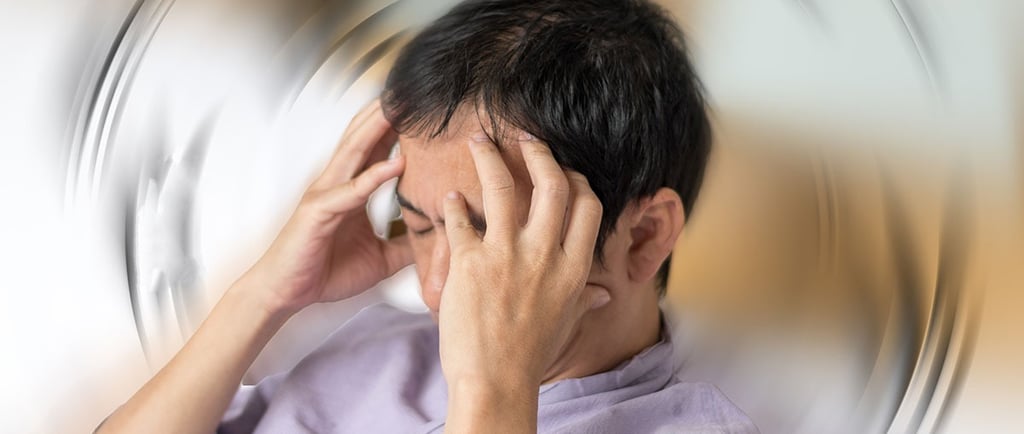Cervicogenic Vertigo: When Neck Injuries Cause Dizziness
If you've been feeling dizzy or unsteady after a neck injury or car accident, you might assume it’s all in your head—literally. But what if the cause is actually in your neck? This condition is called cervicogenic vertigo, and it's more common than many people realize.
Lance Stevenson, DC
7/28/20253 min read


Cervicogenic Vertigo: When Neck Injuries Cause Dizziness
If you've been feeling dizzy or unsteady after a neck injury or car accident, you might assume it’s all in your head—literally. But what if the cause is actually in your neck? This condition is called cervicogenic vertigo, and it's more common than many people realize.
At our Kansas City clinic, we help patients from Overland Park, Raytown, Liberty, Shawnee, Lee’s Summit, and surrounding areas recover from dizziness and imbalance related to both concussions and cervical spine injuries. Understanding cervicogenic vertigo is key to finding relief.
What Is Cervicogenic Vertigo?
Cervicogenic vertigo refers to a sense of dizziness, imbalance, or disorientation that originates from problems in the cervical spine (neck) rather than the inner ear or brain.
This condition is often caused by:
Whiplash injuries
Cervical joint dysfunction
Ligamentous damage in the upper cervical spine
Muscle tension or spasm
Concussions involving neck trauma
It’s especially common after car accidents, where the head snaps forward and backward, creating strain on the soft tissues and joints of the neck.
How Cervical Dysfunction Can Cause Dizziness
Your neck contains proprioceptors—nerve endings that tell your brain where your head is in space. These work together with your eyes and inner ear (vestibular system) to maintain balance and orientation.
When the neck is injured:
Proprioceptive input becomes distorted
The brain gets conflicting signals from the neck and inner ear
This mismatch can lead to dizziness, vertigo, or even nausea
Patients throughout Kansas City, North KC, Blue Springs, and Parkville often say it feels like the room is spinning, or they feel off-balance when turning their head—even though their inner ear tests come back normal.
Symptoms of Cervicogenic Vertigo
You may have cervicogenic vertigo if you experience:
Dizziness triggered by neck movement
Unsteadiness or imbalance
Neck pain or stiffness
Headaches (especially at the base of the skull)
Limited range of motion in the neck
Visual disturbances when moving the head
Difficulty concentrating or foggy thinking
These symptoms often worsen with head or neck movement and may overlap with post-concussion symptoms.
How It Differs from Other Types of Vertigo
Cervicogenic vertigo is not caused by a problem in the inner ear (like BPPV) or the brainstem (like central vertigo). Instead, it’s classified as “non-vestibular vertigo” with a cervical origin.
The key difference is that treating the neck often improves the dizziness—which doesn’t happen with other forms of vertigo.
Who Is at Risk?
You're more likely to develop cervicogenic vertigo if you’ve experienced:
A whiplash injury in a car accident
A concussion with neck involvement
Poor posture or repetitive strain (especially from screen time)
Chronic neck tension or arthritis
Headaches with neck stiffness
This is especially common among auto accident victims, athletes, and patients dealing with post-concussion syndrome in Kansas City, Independence, and Grandview.
How We Evaluate Cervicogenic Vertigo
Our clinic provides a comprehensive exam that may include:
Cervical spine assessment (joint motion, stability, and soft tissue health)
Postural analysis
Vestibular and ocular testing to rule out other causes of dizziness
Balance and coordination tests
Functional movement screens
Ruling out other causes of vertigo—such as BPPV, labyrinthitis, or central nervous system disorders—is critical before confirming cervicogenic vertigo.
Treatment Options
Many patients respond well to targeted therapies that address both the neck and nervous system. Some options are:
Manual therapy or chiropractic care to restore neck joint mobility
Therapeutic exercise to improve cervical stability and posture
Neuromuscular re-education
Vestibular rehabilitation
Eye movement integration (especially if post-concussion)
⚠️ Always consult with your healthcare provider before starting any treatment plan. Proper diagnosis is key to successful outcomes.
Don’t Ignore Dizziness After a Neck Injury
If you’ve had a car accident or concussion and now struggle with dizziness, don’t assume it will go away on its own. Cervicogenic vertigo is treatable, but it often gets overlooked. Early evaluation can make a major difference in your recovery.
Call Dr. Lance Stevenson at 816-226-7476 to schedule a complete assessment. We specialize in treating the root causes of dizziness, balance problems, and neck pain—serving patients across Kansas City, Overland Park, Belton, and surrounding areas.
Been in an Accident? Start Here.
Call us today for a free consultation or with any questions.
Expert Personal Injury Care
Whiplash Chiropractor in Kansas City
Lance@ChiroKC.com
816-226-7476
© 2025 Lance Stevenson, DC, LLC. All rights reserved.
Disclaimer: The content provided on this page is for informational and educational purposes only and is not intended as a substitute for professional medical, legal, or insurance advice. While every effort is made to provide accurate and up-to-date information, it should not be relied upon as the sole basis for decisions regarding your health, legal matters, or insurance claims. Please consult with your healthcare provider, attorney, insurance company, or other relevant professionals for personalized guidance tailored to your specific situation.
1010 Carondelet Dr., Suite 416
Kansas City, MO 64114